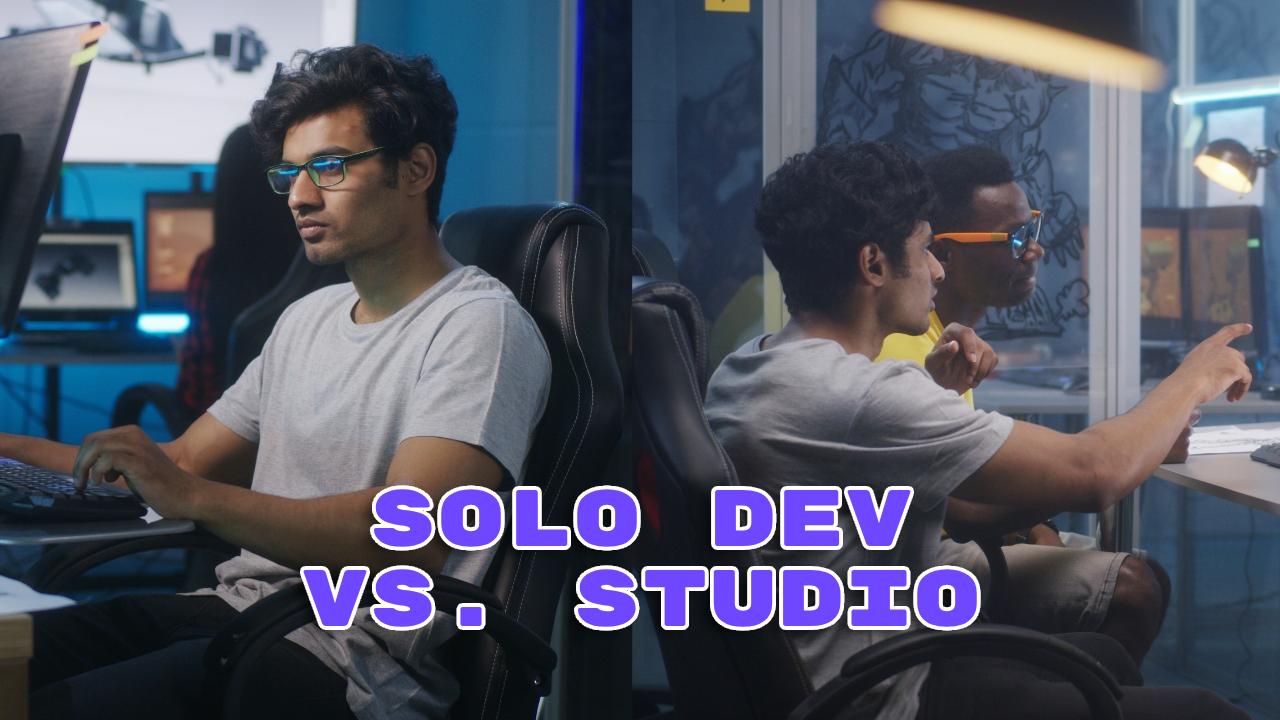Over the decades, the gaming industry has evolved significantly with various big-budget blockbusters. Along with that development, indie games have emerged as a new way to offer unique and extraordinary experiences to players worldwide.
The increasing popularity of indie game development has made it a promising career choice for aspiring developers. However, to start your journey in this field, you have to choose between solo development and joining an indie studio.
Since each option offers distinct pros and cons, let’s explore these considerations more deeply to make clear decisions!
The Solo Indie Game Developer
When you choose to be a solo indie game developer, it means you work on your own to bring unique visions to life.
While this approach comes with its own set of advantages, you also have to face various challenges.
Advantages
Full Creative Control
When you are your own boss, you have the freedom to develop whatever you like in your project.
You don’t have to compromise with others; instead, you are fully in control of bringing your personal vision to fruition.
As a result, your creations will truly reflect your unique artistic concept.
Flexibility
Also, you have the flexibility to work at your own pace. No rushes or rigid schedules, you can choose to work on hours that suit you best, whether day or night.
This adaptability ensures that you work on your own schedule and align it to your personal preferences.
Potentially Higher Profit Margin
Last, you don’t have to split your profits with others in a team. Since the revenue generated by the game goes directly to your account, you have the potential to enjoy a higher profit margin.
If you develop a game and it becomes a huge hit, then you can entirely change your business’s financial situation.
Disadvantages
Heavy Workload
As a solo indie game developer, you have to take care of every aspect of the game, from indie game design to coding, art, sound, testing, and marketing.
This can lead you to feel overwhelmed and burnout, then disrupt the development of indie games.
Loneliness
Moreover, working alone can sometimes be isolating. You may find yourself facing the same 4 walls every day, with no one beside you to support or give feedback.
In other words, the process of game development is surrounded by loneliness and a lack of motivation. This, as a result, challenges you to stay focused on the final goal.
Limited Resources
Lastly, even if you are an experienced solo game developer, you still lack skills in particular areas of indie game development.
For example, when working in a team, while you excel at programming, another teammate might be skilled in graphics.
Consequently, in solo development, you may find it challenging to cover all aspects of game development adequately.
The Indie Game Studio
If you’re finding it challenging to work as a solo developer, then consider the possibility of joining an indie game studio or working with indie game publishers.

Obviously, this option comes with its own set of potential advantages and disadvantages.
Advantages
Teamwork
First, working in an indie game studio means collaborating with a diverse group of individuals. This collaboration is not only essential for game development but also brings incredible experience for you to learn new skill sets from your team members.
Also, teamwork is a source of strength; as a team, you can solve problems, make better games, and come up with creative ideas.
Specialization
Second, since every individual holds a specific role in the indie game business, they can focus on their strengths and passion.
Whether it’s art, programming, or marketing, each member accumulates their skills in their specialized area, thereby enhancing the quality of each game element and the development process.
Shared Responsibilities
Last, you don’t have to endure the burden of work alone. Instead, sharing responsibilities of game development with other team members help you maintain a healthier work-life balance.
This, in turn, reduces stress, minimizes the risk of burnout, and also fosters an enjoyable work environment for everyone.
Disadvantages
Splitting Profits
First of all, more people involved in an indie game studio means the generated revenue is shared among all team members.
While this distribution is totally fair, it can lead you to earn a smaller amount of income compared to solo developers.
Potential For Disagreements
Second, while working in a team offers a lot of creative ideas and visions, it also obtains the potential for conflicts. These conflicts may be disagreements in design choices, story elements, marketing plans, and so much more.
To overcome this, team members in your studio should find compromises and prioritize the project’s success instead of their own preferences.
Increased Overhead
Last, having more members means dealing with higher expenses, including salaries and workspace costs.
If you are the head of an indie game business, you should calculate carefully and find efficient ways to use resources. Otherwise, it can lead to financial difficulties or even bankruptcy.
Factors to Consider When Choosing a Path
Since both options have their own set of pros and cons, it’s up to you to decide the right path depending on various factors such as your skills, goals, and social interaction preferences.
First, you should consider your own skill set and preferences.
Are you a jack-of-all-trades who enjoys taking on multiple aspects of game development? Or do you prefer to specialize in one particular area, such as programming, graphics, or sound design?
By answering these questions, you can determine your strengths and passions and then align them with your chosen path.

Second, focus on your financial goals.
Are you looking for substantial profit from your created games, or is indie game development more of a passion project for you?
Since each path has different potential earnings, your financial objectives will influence your motivation and guide your decision to join an indie studio or work as a solo developer.
Last, think about your social interaction preferences.
Do you find yourself thriving in a collaborative environment and working together with other team members to bring visions to life? Or do you prefer the solitude of solo indie game publishing, where you can unleash your creativity without any restrictions?
Your preferences and personality will shape your level of happiness when being an indie game developer, so you should match them with a suitable environment.
Conclusion
All in all, indie game development can be a lucrative job for aspiring developers in today’s market. Whether you choose to be a solo developer or join an indie studio, each path has its own challenges and rewards.
So, the decision depends completely on you; you should consider carefully what you like, what you’re good at, and what you want to achieve.
Regardless of your choice, from the moment you enter the indie game industry, you will be able to explore a world of opportunity for creativity and success. Let’s follow your passion and make your mark in this exciting industry!
Loading survey...

